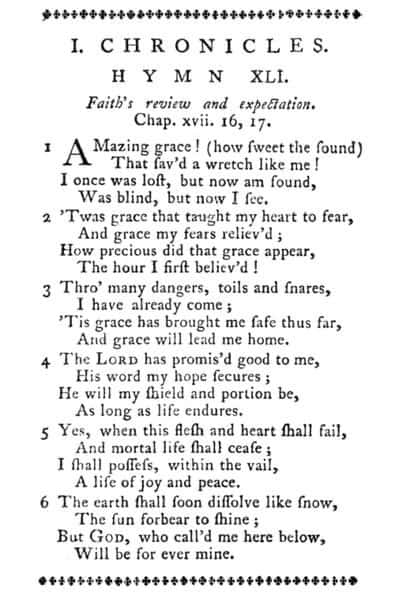Today, for the fourth year, I experience Father’s Day as a father but without a living father. My father passed away in the late summer of 2011. As far back as I can remember, his favorite hymn was “Amazing Grace.” I do not recall this song ever being sung without it drawing tears from his eyes. He sensed deeply that he, like John Newton, would never have turned to Jesus in his own strength. It was nothing less than the gracious power of God that brought him to faith and kept him in faith.
A couple of years ago, I worked through the original lyrics of “Amazing Grace” as well as the autobiography of John Newton. The autobiography consists of a series of letters collectively titled An Authentic Narrative of Some Remarkable and Interesting Particulars in the Life of Reverend J. Newton—clearly reflecting a time when publishers were not looking for pithy phrases to drive their publicity campaigns.
My foray into the writings of John Newton led me to a couple of particularly noteworthy rediscoveries: a beautiful declaration of confidence in the sufficiency of the gospel, and two stanzas from “Amazing Grace” that have fallen into disuse over the past two centuries.
“Suitableness to Answer All My Needs”
Reflecting on God’s choice to save him at a time when he was seeking only his own pleasure, John Newton spoke these words of gratitude:
“I can see no reason why the Lord singled me out for his mercy but this, ‘that so it seemed good to him’; unless it was to shew … that with him ‘nothing is impossible.’ … I had a satisfactory evidence in my own mind of the truth of the gospel …. and its exact suitableness to answer all my needs. I saw that, by the way there pointed out, God might declare not his mercy only, but his justice also, in the pardon of sin, on the account of the obedience and sufferings of Jesus Christ.”
The gospel exhibits “exact suitableness” for “all my needs”; it fits the lock of the deepest needs of the human heart and satisfies them fully and suitably. If I do not sense the full sufficiency of this good news, it is because I have not recognized my soul’s truest, deepest need. This truth stands at the heart of Christ-centered counseling, but Newton knew it well more than two centuries ago.

The Unsung Stanzas of “Amazing Grace”
The original words of “Amazing Grace” were not wedded to the tune that is so familiar to us today, and the lyric was known as “Faith’s Review and Expectation” (see this post for more about the original context of the hymn).
Another lesser-known fact about the hymn is that a couple of John Newton’s original stanzas have dropped into relative disuse—though one of them has reappeared in a relatively recent reworking of the hymn by Chris Tomlin—while the familiar verse that begins “When we’ve been there ten thousand years…” wasn’t penned by Newton at all.
The unsung stanzas speak clearly of death and of the dissolution of this present earth. Perhaps their descent into disuse has something to do with our contemporary discomfort when it comes to discussing these topics. In these stanzas, Newton confessed:
“Yes, when this flesh and heart shall fail,
And mortal life shall cease;
I shall possess, within the veil,
A life of joy and peace.“The earth shall soon dissolve like snow,
The sun forbear to shine;
But God, who called me here below,
Will be forever mine.”
Nearly four years ago, in the moments when my father grasped for his final gasps of breath, my mother, my wife, and I sang the better-known verses of “Amazing Grace” to him. We did not sing these last stanzas. We did not need to, I suppose, because moments after we sang the first stanzas, he was living the last ones.
Happy Father’s Day, Dad.
We look forward to that day when we see you again, when the sun will “forbear to shine” because the Light of the World has dawned at last.


